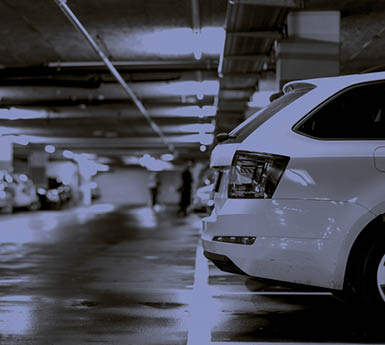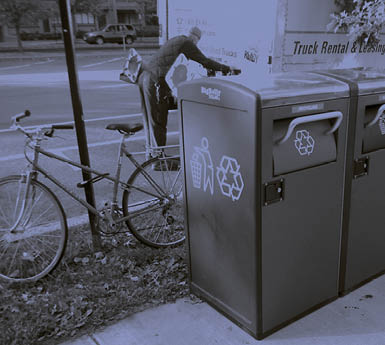1. Glasgow City Council
With the help of £24 million in funding from the Technology Strategy Board, now known as Innovate UK, Glasgow City Council has embarked on a project called Future City Glasgow, aimed at making life in the city safer and more sustainable.
Along with projects to crowdsource cycling information and optimise routing for the minibuses that transport children and social work clients, the council has been trialling a new intelligent street lighting system.
The internet-connected LED light bulbs not only have lower energy consumption than standard sodium lights, they can also respond to demand.
If there’s nobody around, they remain low; but if they sense a cyclist approaching they automatically adjust their brightness level from about 40 per cent to full.
The lights can be remotely brightened for street festivals or outdoor concerts and can also record air quality, noise and movement.
“It currently costs around £8.5 million a year to power and repair the city’s street lights. With the longer life cycle of LED lamps, we not only reduce our future maintenance and associated costs, but also our carbon emissions,” says council leader Frank McAveety.
“It was found that an energy saving of up to 68 per cent could be achieved through the use of LEDs and the central management system will also achieve additional savings.”
 2. North Tyneside Council
2. North Tyneside Council
In 2014, North Tyneside Council embarked on a robotic process automation (RPA) project with the aim of improving service quality and consistency while cutting costs.
Initially handling revenues and benefits services, the robot software enters information submitted online and proceeds with the processing on the basis of a set of rules. The software follows the business process flow chart, flagging up any areas of uncertainty for human intervention.
“This work is all about making our services more responsive to residents’ needs, as well as making them more efficient,” says mayor Norma Redfearn.
The system has, says the council, cut the time spent on data input by 50 per cent, speeded up claim resolution and reduced the time taken to process new claims by 45 per cent. More than half of new benefits claims are now assessed within 24 hours of submission. While in 2014 it took 36 days to fully process a new benefit claim, it currently takes just 25.
The council is now encouraging staff to extend the system by writing their own RPA procedures, automating the annual job of collating social housing stock rents and updating benefit details, for example. Future projects are likely to include automating the process for managing council tax account credits.
 3. Milton Keynes Council
3. Milton Keynes Council
As part of its smart cities programme MK:Smart, Milton Keynes Council is aiming to make life easier for motorists and cut the cost of running parking services by installing hundreds of sensors across the city’s car parks.
The sensors monitor occupancy, with the data transmitted wirelessly to receivers on lampposts and analysed in the central MK Data Hub.
They provide real-time information on the availability of parking spaces, which drivers can access via an Android or iPhone app and then use to reserve a space.
With the land value of a parking space reckoned at £10,000 to £15,000 and annual maintenance at between £200 and £300, the aim is to reduce the number of spaces required.
The council says it’s hoping for a capital saving of at least £105 million, along with reduced fuel use and vehicle emissions.
“As well as giving real-time data on parking availability, the sensors are providing us with valuable information about average parking duration,” says Brian Matthews, head of transport at Milton Keynes Council. “We can use that to adjust parking restrictions to meet majority customer needs.”
For example, when the sensors revealed that an average stay in the station drop-off zone was 16 minutes, the council adjusted the wait limit up to 20 minutes. In future, the system could also be used to aid parking enforcement.
 4. Hampshire Country Council
4. Hampshire Country Council
Of Hampshire’s 1.3-million population, 235,000 are over 65 and around 16,000 have been assessed as having critical or substantial needs, presenting a major problem in terms of social care.
But through an award-winning partnership with PA Consulting Group, the council has been able to introduce a range of assistive technology aimed at improving services while cutting costs.
Its telecare system includes GPS-equipped personal alarms for use inside and outside the home. Motion sensors can automatically switch on a light when the client gets out of bed, and activity monitors, fall detectors, incontinence and epilepsy sensors, medication reminders and management and bed or chair occupancy sensors are also available.
“With Hampshire’s older population growing rapidly in number and many people living with long-term health conditions, technology is becoming an increasingly critical part of the way we support people to remain living as independently as possible, for as long as possible,” says council leader Roy Perry.
The system currently covers around 6,500 Hampshire residents and, says PA Consulting, saved the council £1.9 million in its second year of operation, even though the service is offered free.
“We have a service that improves lives and costs us less than nothing,” says Richard Ellis, the council’s deputy director of adult services.
 5. Rugby Borough Council
5. Rugby Borough Council
Last year, concerned that bins in parks and play areas were full to overflowing at weekends, Rugby Borough Council decided to take action. While it was keeping on top of the problem with extra collections, this was proving expensive.
To try and deal with the problem, it replaced 56 traditional bins, each of which had been receiving up to three collections a day, with 23 Bigbelly smart stations.
Thanks to a compactor, powered by a solar panel, each bin can hold up to eight times more rubbish than a traditional street bin. Sensors monitor how full each bin is triggering the compactor when required and sending an e-mail and text message to the council when it’s nearly full.
The council says this has cut the number of manual waste collections from 51,100 a year to just 1,509. Resources saved have been transferred to other street cleansing services, such as litter picking on the main trunk roads into Rugby town centre.
“Not too long ago we’d carry out regular waste collection ‘milk rounds’, regardless of whether the bins needed emptying or not,” says Sean Lawson, head of environment and public realm at Rugby Borough Council.
“These days we’re notified when collections need to be made and can clearly see when bins don’t need emptying just by looking at a smart device or office computer.”
